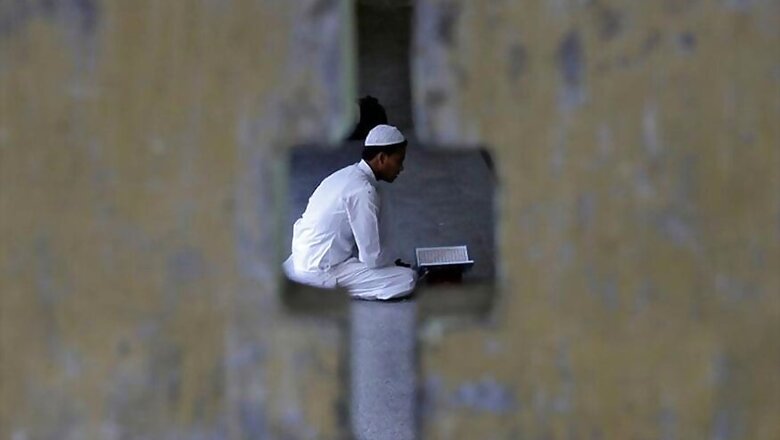
views
New Delhi: In an effort to reach out to children locked out of schools and seminaries in Kashmir, the Pakistan-based Jaish-e-Muhammad has released a book containing stories and cartoons promoting jihadist violence. The book, Musalmaan Bacchey, or ‘Muslim Children’, was released online through online jihadist feeds over the weekend.
“India teri maut ayi, Jaish ayi, Jaish ayi”, screams the hand-written slogan above a drawing of a sword piercing India’s national flag, drawn in what appears to be a school notebook [‘India, the Jaish is coming to kill you’], an invocation of a slogan first used by followers of the rival Lashkar-e-Taiba in Kashmir.
“There’s going to be some pro-jihadist parents who might not be happy their kids are being encouraged to doodle in their textbooks,” said one police officer, wryly.
“But I’m guessing that the Jaish-e-Muhammad has been watching schools teaching kids online, and has realised there’s an audience for this kind of propaganda among its followers in Kashmir.”
The narratives in Muslim Children mirror the archetypes of traditional children’s fables and fairy tales, substituting Indian characters for the ogre, and jihadists for the good prince.
In one typical story, a fictional Indian Army officer, Major Jaswant, heaps oppressive violence on innocent villagers in Kashmir — whose prayers for deliverance are finally answered by jihadist fighters.
“From Afghanistan to Syria and Iraq to Kashmir,” the story ends, “you will find people with light shining from their faces”. “These are men who have promised to fight jihad until the end. And these are the kind of people evil men like Jaswant are afraid of.”
The content in Muslim Children suggests that the Jaish-e-Muhammad leadership is concerned that young people locked out of schools may be spending their time consuming mass culture instead of ideologically-appropriate content.
In one story, a teacher explains to students “that Hindus and Muslims are different nations”. “We try to copy them. We try to dress like them but why did we sacrifice so much if this is what we were going to do? Why did we make a separate country?”
The publication of Muslim Children comes amidst signs jihadist groups are rebuilding their mass support base, disrupted severely in the course of the months-long lockdown which followed New Delhi’s decision to roll back Kashmir’s special Constitutional status last year.
Large crowds have defied police and assembled for the funerals of jihadists slain in recent days — among them, that of local Jaish-e-Muhammad commander Sajad Nawab Dar and the Hizb-ul-Mujahideen’s Ashraf Malik.
Even though Muslim Children marks the Jaish-e-Muhammad’s first attempt at producing children’s literature, the genre has a long history. Perhaps ironically, the first publisher was the United States’ Central Intelligence Agency, which spent millions of dollars producing and disseminating pro-jihad textbooks for use at Afghan refugee camps in Pakistan during the 1980s.
“The primers, which were filled with talk of jihad and featured drawings of guns, bullets, soldiers and mines, have served since then as the Afghan school system's core curriculum,” The Washington Post reported soon after 9/11.
“Even the Taliban used the American-produced books, though the radical movement scratched out human faces in keeping with its strict fundamentalist code.”
Later, the Lashkar-e-Taiba ran at least two publications for children — a monthly magazine called 'Nanhe Mujahid', which evolved into a bi-weekly called Roz-e-Tafaal. The Lashkar’s own network of schools and seminaries provided an organic means for the distribution of this literature which, like Muslim Children, consisted in the main of simple stories for young readers.
There are no studies of the impact such publications by jihadist groups have had, but research on pro-jihad school curricula in some countries has thrown up evidence they contribute to drawing young people to violent movements.
In 2015, the Maldives Democracy Network said inflammatory language in schoolbooks — including attacks on religions other than Islam, and defences of misogyny and slavery — made it easy for Islamic State and al-Qaeda recruiters to seduce young people from the island republic to their cause.




















Comments
0 comment